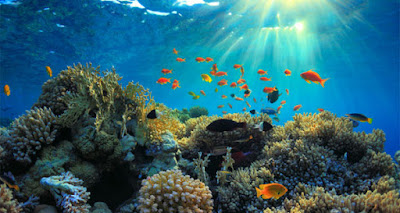Are marine reserves needed to protect global fisheries?
Marine reserves are a crucial component in protecting global fisheries and
ensuring a healthy ecosystem. Productivity and species diversity are often used
to measure the health of an ecosystem and it is exactly these components that
are declining in many coastal habitats.[1]
A marine reserve is an area of ocean that is completely protected from any and
all extraction activities (i.e. fishing, netting). This protection from
extraction activities makes marine reserves a useful tool for ecosystem-based
management because habitat alternation ends allowing for the recovery of
several species populations at the same time.[2]
Community outreach is an excellent way for resource
managers to hear and consider the concerns of the local citizens affected by
marine reserves as well as for citizens to learn about the benefits and
importance of marine reserves. Marine reserves are a useful tool to learn more
about ocean resources and protect them for future use. Together with Oregon
State University, Oregon's Ocean Policy Advisory Council (OPAC) is developing
an outreach program to inform the public about marine reserves, listen to
community concerns and gather feedback about the concept and the process.[3]
There is a need to preserve intact marine ecosystems
on a regional basis. It does not suffice to manage a single species since many
fisheries already affect many different species through by-catch. Admittedly,
marine reserves will not solution every problem. They can curtail habitat
destruction, ease the effects of local over-fishing, simplify the simultaneous
management of multiple species and reestablish biodiversity within their
borders.
Marine reserves are different than marine protected
areas. Marine protected areas restrict human activities for conservation. Of
the 5,000 marine protected areas in the world covering an approximate area of
2.85 million km2, only 10% approximately 300,000 km2 are
marine reserves.[4] Oregon
has established two pilot marine reserve sites a marine reserve at Otter Rock,
north of Newport, and a marine reserve and associated marine protected area at
Redfish Rocks, near Port Orford.[5] Four other sites are undergoing further
consideration and evaluation as sites for future marine reserves. Worldwide
there are only two marine reserves: Galapagos Islands and Heard Island and
McDonald Island in the Australia Antarctic Territories.[6]
[1] Anzinger,
D. (2010). Issues in Natural Resources
Conservation. New York, New York: McGraw Hill Companies, 2010. Quote on
page 323.
[2] Anzinger, (2010).
[3] Sea Grant Oregon. (2010).
A proposed framework for identifying and evaluating ecosystem service tradeoffs
for marine protected area planning. Oregon State University.
[4] Protect Planet Ocean. (2010).
Global facts about MPAs and marine reserves. Retrieved from http://www.protectplanetocean.org/collections/introduction/introbox/globalmpas/introduction-item.html
[5] Oregon Coastal Management Program. (2009). Stay
Up-to-Date on Marine Reserves: Status of the Marine Reserves Process. Retrieved
from https://www.oregonocean.info/index.php?option=com_content&view=category&layout=blog&id=9&Itemid=9
[6] Protect Planet Ocean.
(2010).




Comments
Post a Comment